2024 SA ELECTION RESULTS



new constitution.
The Student Association ballot inaccurately represented proposed constitutional changes that “consolidated power in the hands of fewer people,” an unnamed student alleged in a complaint filed with the University Court Feb. 22.
Specifically, the ballot failed to disclose the new constitution’s elimination of turnout thresholds for future amendments, the complaint said. The constitution was ratified Feb. 29 with 83.2% of students voting in favor; 1,639 students — 35.8% of the undergraduate body — voted on the ballot question.
“The complainant alleges that the Student Association acted improperly when they failed to mention on the official summary that the constitution was being amended to eliminate the need for a 2/3rds majority and 20% turnout in order to change the [constitution],” UCourt chair Hugo Gerbich Pais wrote in an email to the Thresher.
The unnamed complainant accused the SA of initiating a power grab with the
“[The SA] misrepresented the content of the amendment in order to pass an amendment that consolidated power in the hands of fewer people,” the student wrote.
The complaint also noted that the summary of the changes said “amendments can be passed by a majority of students when in actuality it is a majority of responding students.”
The new constitution passed the Senate in November 2023. The amendments were brought to the student body for approval on the SA regular election ballot last week.
When students opened their ballots, the final question, titled “CONSTITUTIONAL CHANGES,” listed a series of “major changes” and provided a link to a document where students could review all the changes.
A previous complaint was filed in April 2023 about the legitimacy of a nearly identical series of constitutional amendments, which passed in an election that did not meet the approval
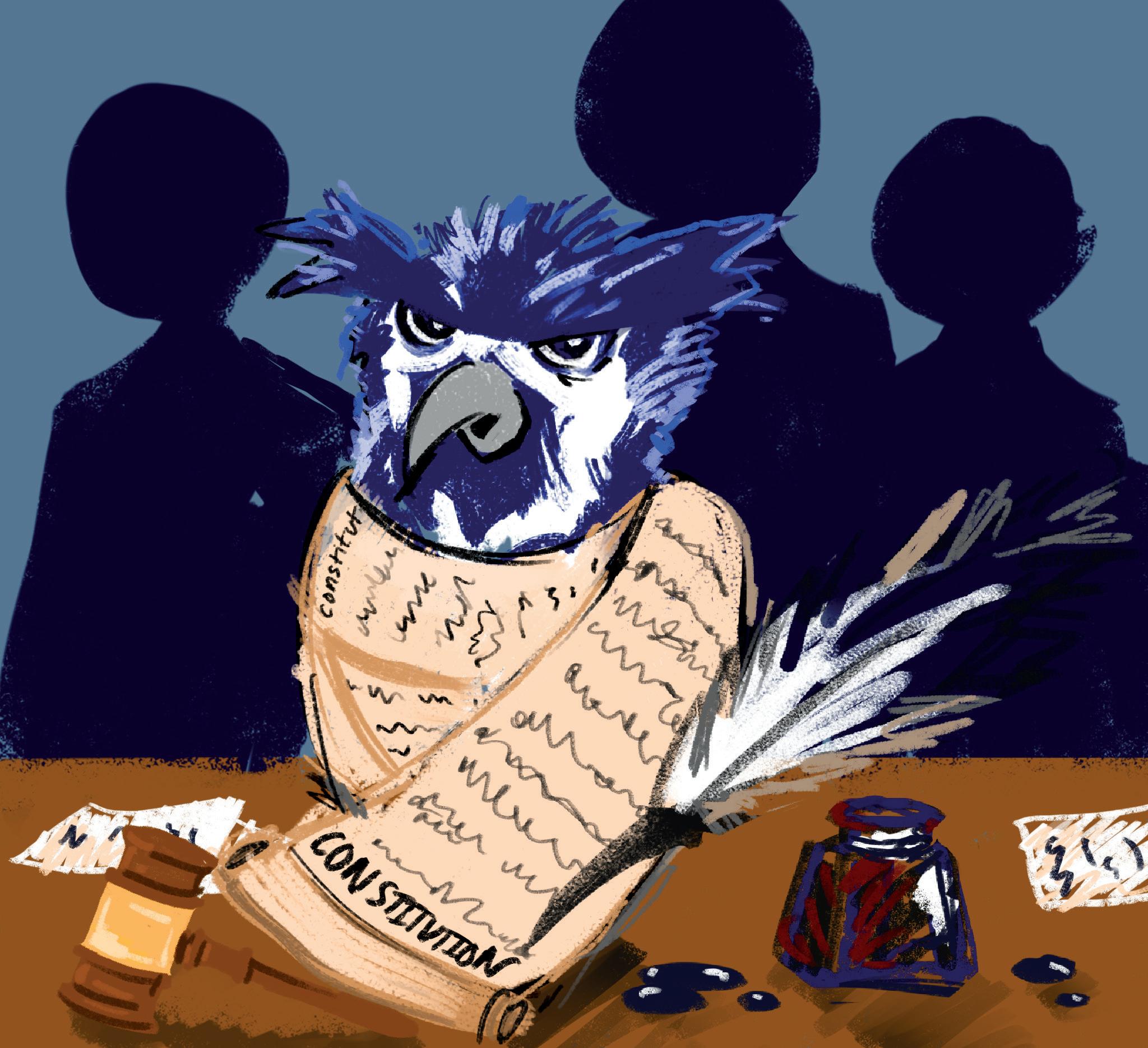
How to get your money from Rice’s ‘568 cartel’ lawsuit settlement
Rice settled a class action lawsuit in February for $33.75 million. The complaint alleged that Rice and 16 other elite universities illegally conspired to limit financial aid. Rice settled before trial — as do the vast majority of civil cases — and the university denies any wrongdoing.
Ten of the 17 universities have settled so far, each for a larger sum.
The settlements currently total $284 million. An estimated 200,000 current and former students at the universities are eligible for the settlement payments, including many Rice students and alumni.
The plaintiffs estimate that the average claimant will receive $2,000. You can’t yet file a claim, but you can register for updates from the settlement administrator to stay on top of the news.
Here’s what to know.
How
The court preliminarily approved Rice’s settlement in a Feb. 28 filing. The court also approved the settlement website and notice plan. The courtappointed settlement administrator — in this case, the Angeion Group — will start to use emails and addresses from Rice’s directory information to reach out to eligible students and alumni.
Rice students and alumni since Fall 2003 could be eligible for the settlement. Specifically, you must be a U.S. citizen or
permanent resident who received needbased financial aid covering some — but not all — of your tuition, fees and room and board. (If you received a full ride, any allegedly improper limits on financial aid wouldn’t have affected you.)
The court-approved settlement website is financialaidantitrustsettlement.com. You can click “register for updates” to be notified when you can apply for the settlement class.
Editor’s Note: This article has been cut off for print. Read more at ricethresher.org.
Jae Kim has been elected to serve as the next Student Association president, receiving 64% of first-place votes against Trevor Tobey, who received 34.2%.
Kim, currently the Brown College president, ran on a platform of student advocacy, sustainability and diversity, equity and inclusion. Tobey, the outgoing Hanszen College senator, ran on a platform of fiscal responsibility and SA organization efficacy.
“I’m looking forward to everything we will be able to get done this year. I’m grateful to everyone that helped me with my campaign,” Kim told the Thresher.
1,928 students voted in the election, amounting to a voter turnout of 42.09%, nearly triple last year’s turnout of 15.02%.
Thomas Ngo narrowly secured the treasurer position in a race against Joshua Stallings. Ngo, a McMurtry College freshman, took 49.5% of firstplace votes while Stallings, a Duncan College sophomore, claimed 48.2%.
SA Director of Elections Jocelyn Wang said there will not be a recount. Because neither of the candidates received 50% of votes, the SA’s ranked-choice voting system kicked in. The 34 first-place votes in the “writein” category were redistributed, with 18 marking Ngo as their second choice and 16 marking Stallings. Ngo ended with a lead of 21 votes.
Chelsea Asibbey, receiving 53.6% of first-place votes, won the secretary position in a race against Calla Doh.
executive positions, which she said was the root of more active campaigning and social media presence from the candidates. Wang also said that greater SA social media promoting the candidates and their platforms also likely contributed to higher turnout this election.
The ballot also included a constitutional amendment, which was approved with 83.2% of votes in favor. The amendment eliminates a 20% minimum voter participation for future constitutional amendments and allows for a simple majority student vote for approval rather than a favorable two-thirds vote. It also decreases the necessary Senate votes for a resolution to pass from two-thirds to a simple majority.
The amendment additionally introduces reforms to the Blanket Tax Committee that oversees some $400,000 in student funds, stipulating that the three treasurer-appointed voting members must be Senate members.
A student filed a complaint against the ballot’s description of the amendment with the University Court, according to an email from UCourt Chair Hugo Gerbich Pais to the SA listserv. UCourt has launched an investigation.
The amendment was initially approved by the Senate in April 2023, but did not receive the 20% of student body votes in the special elections necessary for ratification. It faced a previous UCourt investigation in the fall.
The Student Association only has legitimacy and the influence that it wants to have if it’s perceived … to be a body that can enact real change.Jae Kim STUDENT ASSOCIATION PRESIDENT
Crystal Unegbu will serve as the next internal vice president and Asianna Junge as the next external vice president after winning uncontested races.
Ngo and Asibbey were not on Kim’s ticket, which included Junge, Unegbu, Stallings and Doh.
SA data shows that this year’s voter turnout was the highest since 2018, when 51.6% of students voted.
Wang attributed the higher voting turnout to the number of contested
The ballot also included elections for Blanket Tax Organization presidents. This includes the Campanile editorin-chief, Thresher editor-in-chief, KTRU station manager, Rice Rally president, Rice Program Council president, University Court chair, Rice Student Volunteer Program chair and Rice Women’s Resource Center director.
However, Wang said the race for Rice Women’s Resource Center director is under investigation after allegations of candidate misconduct in the internal approval process.
“The elections committee received a complaint concerning the election of
the RWRC director. They were advised to not publicize results until the election committee has investigated the matter and released a decision regarding the validity of the complaint,” Wang wrote in a message to the Thresher. “A proper investigation ensures the fairness and integrity of the elections and the Student Association are preserved.”
In an interview after the election, Kim said that he is looking forward to the presidency. Regarding the election of Asibbey and Ngo, who were not on his ticket, Kim said he was excited to work with new people who may bring new ideas to the SA.
“I’m excited to hear their thoughts, hear their vision and incorporate that into the work that we do,” Kim said.
Tobey said that he is grateful for the conversations he started around campus.
“I am very proud of the campaign that we ran, and am so thankful for all the people that helped us in sharing our vision for campus,” Tobey wrote in an email to the Thresher. “This was the start of something special and the conversations we started, the friends we met and this experience alone made it all worthwhile.”
While reflecting on her victory, Asibbey thanked the voters and the people around her.
“I want to say thank you to everyone who took the time to vote, I could not have won without you,” Asibbey wrote in an email to the Thresher. “Thank you to my friends and family for their ongoing support. Thank you Jesus for holding it down. Once again, thank you to the people for giving me the opportunity to serve you. I aim to spend this next term leaving things better than I found it.”
Once he assumes office, Kim said his first priorities are to assemble a strong executive-appointed team and prepare budgeting for the upcoming fiscal year. Another priority, Kim said, is to engage with the student body more.
“The Student Association only has legitimacy and the influence that it wants to have if it’s perceived … to be a body that can enact real change,” Kim said. He said he hopes to achieve this, in part, through student outreach and advocacy from non-voting members.
“I really want non-voting member students to feel comfortable … using the SA’s resources and connections and using this organization as a vessel to enact the changes that they’d like to see,” Kim said.
FROM FRONT PAGE COMPLAINTand turnout requirements. In October 2023, UCourt ruled the ratification unconstitutional and unanimously overturned the amendment.
“The Student Association declared [in April 2023] that they had successfully amended the constitution, and the court found very clearly that this was not true,” Gerbich Pais, a Duncan College junior, wrote in his email to the Thresher. “The constitution says very clearly that they need a two-thirds majority and 20% voter turnout. They got neither of those.”
Since the complaint is not electoral in nature — that is, it does not dispute the legitimacy of the results but rather “alleges the Student Association acted improperly” — UCourt will conduct the investigation as opposed to the SA elections committee, Gerbich Pais said in the SA listserv notice.
Gerbich Pais said that they will host an investigative panel with UCourt officers and evaluate the evidence, like the text of the constitution and bylaws, as well as hear statements from the complainant and SA representatives. The committee will either dismiss the case or enact a full case hearing.
The new constitution will remain in effect unless UCourt decides otherwise, Gerbich Pais added.
“Throughout this process we will consider the SA constitution in its entirety, and where the constitution does not provide us explicit black or white answers, we will consider the document’s foundational principles,” Gerbich Pais wrote.
According to Gerbich Pais, if UCourt finds the SA in violation, it will consider remedies or sanctions based on what the court finds.
Other amendments to the constitution included changes to the Blanket Tax. The new constitution stipulates that the Blanket Tax Committee will partake in an annual spring review of organizations to “ensure proper adherence” of the funds, and requires that the three treasurer-appointed members are SA senators. Further, $14.50 of each student’s Blanket Tax is now allocated to the Thresher to “maintain editorial integrity and independence.”
Editor’s Note: This article has been cut off for print. Read more online at ricethresher.org.
 RIYA MISRA EDITOR-IN-CHIEF
RIYA MISRA EDITOR-IN-CHIEF
Peggy Whitson ’86, widely dubbed “America’s most experienced astronaut,” will speak at the 2024 commencement ceremony May 4, President Reggie DesRoches announced in an email to the Rice community Feb. 29.
A native Iowan, Whitson received her doctorate in biochemistry from Rice before working at Johnson Space Center. Her first space flight was in 1992 aboard Expedition 5, according to Whitson’s NASA biography. Since then, she’s spent 675 days in space, performed 10
spacewalks and become the first female commander of the International Space Station.
“Whitson’s background, career path, accomplishments and work in space exploration are truly impressive and trailblazing,” DesRoches wrote. “Over the past almost four decades, she has held various remarkable leadership positions, often being the first woman to do so.”
Whitson retired from NASA in 2018 after three missions to the ISS, a fouryear stint as the most senior astronaut at NASA and more minutes in space than any other American. She’s now
the director of human spaceflight for the privately-funded Axiom Space, becoming the first woman to command a private space mission after returning to the ISS aboard Axiom-2 in May 2023.
TIME Magazine named Whitson as one of their 100 most influential people in 2018.
“A very high professional standard — that’s what her name means in the astronaut community,” Thomas Pesquet, European Space Agency astronaut, wrote about Whitson for TIME. “It’s no wonder that [Whitson] has almost singlehandedly redefined the role of women in space exploration.”
Former Rice president David Leebron has been named the incoming president and CEO of Texas 2036, a nonpartisan, nonprofit organization that uses data and research to address issues in Texas policy.
Texas 2036 focuses on issues of Texas’ education and workforce, health, natural resources, infrastructure, government performances and various other areas with the mission of “[enabling] Texans to make policy decisions through accessible data, long-term planning and statewide engagement,” according to their mission statement.
Since ending his term as Rice’s president in 2022, Leebron has held various visiting professorships and has
classes at Rice. Leebron said he looked into a number of different academic roles before choosing to pursue a position at Texas 2036.
“I looked at some of [the] other more academic roles and they were intriguing, but I was also interested in doing something new and different — something more closely connected with policy and political spheres in Texas,” Leebron said. “I have been heavily invested in issues that affect the city of Houston through my time at Rice, but this was an opportunity to directly engage with crucial policy issues that affect people throughout the state.”
David Marc, the chairman of Texas 2036’s Board of Directors, said he is excited to have Leebron joining the organization and advancing its mission.

“We are thrilled David has agreed to lead Texas 2036 into its next phase of growth,” Watts wrote in an email to the Thresher. “The Board and I look forward to him expanding his leadership and influence beyond Houston to help ensure a brighter, stronger future for all Texans. Having David as our CEO is great for Texas 2036, great for Rice and great for Texas.”
Leebron said he was attracted to the organization’s specific social policy aims, which motivated him to join Texas 2036.
“Texas 2036 is a pretty unique organization,” Leebron said. “Its goal is to focus on what Texas needs to achieve by the year 2036 to continue as a state that people want to live in, that supports the welfare of its
people, that attracts businesses that create opportunities and that engages directly with the legislature and policymakers.”
Marc said that Leebron’s leadership would ensure that the remaining legislative sessions would be best utilized to maximize progress by 2036.
“Texas 2036 is committed to ensuring that Texas remains the best place to live and work through the state’s bicentennial in 2036 and beyond,” Marc wrote. “With just six regular sessions of the state legislature between now and 2036, David’s leadership [will] be transformative as the organization works to expand its impact … to ensure that Texas is on the right path ahead of its bicentennial.”
Leebron’s ability to leverage existing connections and create new partnerships to advance awareness and funding for the organization.
“David knows what it takes to enhance the work we are doing in support of our mission, to build effective partnerships and collaborations, and to translate academic research into meaningful results,” Marc wrote.
Being at Rice will give me an opportunity to have a wide variety of conversations and learn from a number of people, including those involved in public policy, education and health care. I hope to be able to learn and gain insights from them.David Leebron TEXAS 2036 PRESIDENT
Leebron said he will continue to work as a professor at Rice, teaching one course in the fall.
“I’m very excited to be able to maintain an affiliation and presence at Rice,” Leebron said. “Being at Rice will give me an opportunity to have a wide variety of conversations and learn from a number of people, including those involved in public policy, education and health care. I hope to be able to learn and gain insights from them.”
Marc said that he is confident in
“He demonstrated these abilities time and again during his leadership of Rice and I know Texas 2036, and by extension, Texas will benefit from them as well.”
In Texas’ diverse political landscape, Leebron said that he hopes Texas 2036 will serve as an example of making legislative and policy advancements, despite political obstacles.
“I hope to set an example for the state and the country about how data and research can be applied in a highly divisive and divided political environment to foster change,” Leebron said. “I am now meeting extraordinary people from all across the state, [some] whose politics are different [from] mine. We are going to engage in a dialogue about things we agree and disagree on, and I hope to find common ground.”
The spring 2024 Rice Undergraduate Research Symposium has been replaced with new events specifically for the humanities, social sciences and natural sciences
RURS is an annual research symposium hosted by the Office of Undergraduate Research and Inquiry since 2002. RURS previously housed oral and poster presentations for engineering, humanities, natural sciences and social sciences research. In 2023, OURI hosted additional events the week of RURS highlighting student academic projects in different departments, which has expanded this year to two Inquiry
Weeks.
The first annual Humanities Day will take place April 9, while the first Social Sciences
Undergraduate Research Showcase and Natural Sciences
students from many fields of research, its logistical constraints made it hard to cater to different kinds of presentations.
“It’s a bit unfortunate that there’s no singular defined event [this year] where all of campus can come together and share their research and students can get more exposure between different events just through being in the same space,” Li, a Wiess College junior, said. “But I also think it’s good that having the different departments oversee their own symposiums can also let students share their work in the exact kind of format that RURS might not have been able to facilitate.”
There’s so much creative work that’s [in] all the schools across campus, so I think that this is just showcasing that a little bit better than maybe RURS did in the past.Abby Schuh ASSOCIATE DIRECTOR OF OURI
Undergraduate Research Symposium will each happen April 11.
Abby Schuh, the associate director of OURI, said RURS was divided into multiple events to offer more flexibility and presentation opportunities for non-STEM students.
“Our office was looking to create a more inclusive event that represented the wide range of research design and creative work that was happening on campus,” Schuh said. “The undergraduate research symposium was a great poster session for … STEM students or STEM-adjacent students. There were a few social science students and some humanities students, but it was a more difficult format for those students, especially in the humanities.”
Hannah Li, a head peer research ambassador, was a 2023 RURS co-chair. She said that while RURS brought together
Lauren Kapcha, the assistant dean for communications of the School of Natural Sciences, said that NSURS will follow the poster presentation format of RURS. She noted that the new symposium will be able to meet the demand of natural sciences presentations that RURS may not have been able to.
“Moving this into the School of Natural Sciences, we’re able to accommodate all of our students who want to share their work,” Kapcha said. “Any student in natural sciences, no matter how early or advanced they are in their research, will be able to present in the symposium because we don’t have the same limitations on space.”
SSURS will feature traditional research posters and oral presentations as well as creative work. Abbey Godley, the assistant dean for student programs for the School of Social Sciences, said the school wants to involve students at all stages of research, including different types of class projects.
“A number of our faculty in social sciences have devised ways for final research products to not always be a research paper or a research poster,” Godley said.
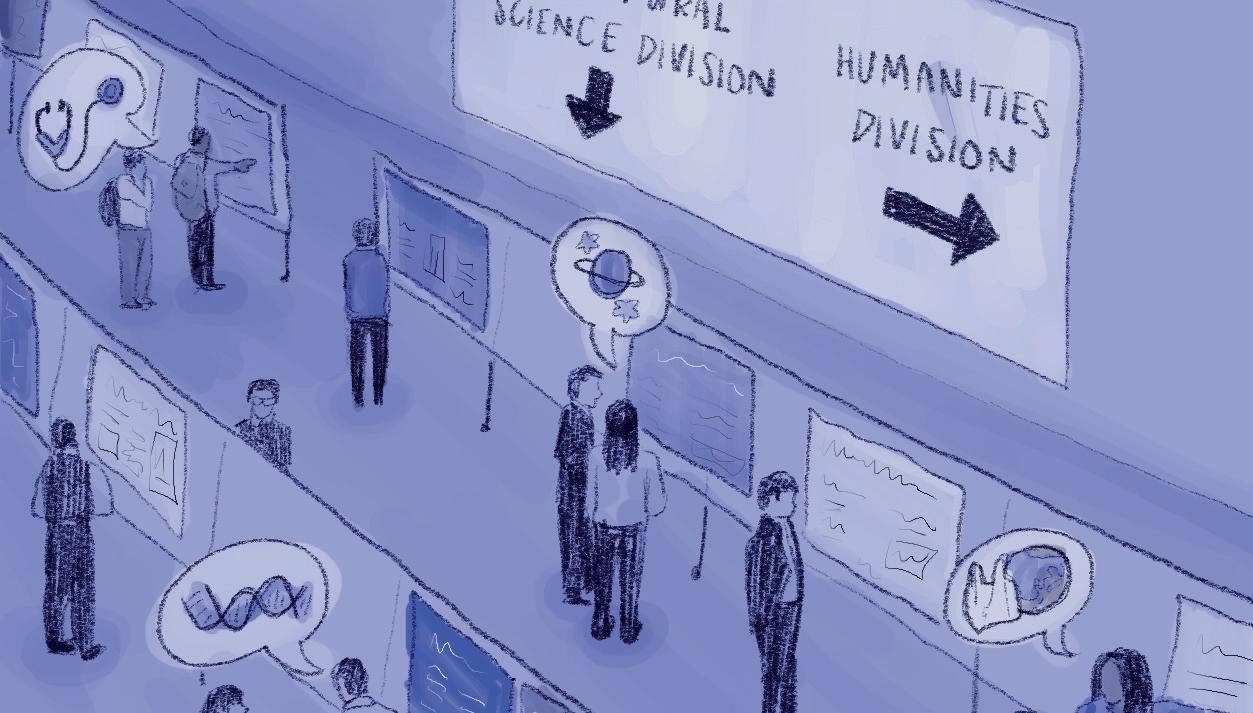
Similarly, Humanities Day will have sessions exhibiting artwork, oral and poster presentations and medical humanities practicum work. Natasha Bowdoin, the associate dean of Humanities for undergraduate programs and special projects, said that the showcase was designed to highlight the importance of the varied work in the humanities for undergraduate research as a whole.
“Humanities Day is about educating and sharing with the larger Rice community what Humanities research is about, how it can look, and the critical contributions it can make across all fields and disciplines,” Bowdoin wrote in an email to the Thresher.
Director of OURI Elizabeth Eich said that one benefit of expanding the number of events during Inquiry Weeks is that more students can be awarded for their work. Additionally, the Shapiro Showcase, which highlights top undergraduate researchers as nominated by faculty across schools, will feature twice as many student presentations.
Jacob Buergler presented psychology research in the RURS poster session and Shapiro Showcase last year and will be participating in SSURS this year. Buergler said that dividing RURS will limit the research that students get to learn about because they will be presenting in showcases based on the
department that their research falls under.
“You might be aiming for, for example, a B.S. in neuroscience, but if your research is more psychologically oriented, you’d present with social sciences even if you consider yourself more natural sciences,” Buergler, a Baker College junior, said. “But I think you’ll also be fine … This kind of forces you to see other individuals in your field.”
Li hopes that this year’s expanded Inquiry Weeks can engage more students from across campus in all of the events.
“Even though all these research showcases aren’t on the same day or in a singular event, it should hopefully have students cross mingle and attend all the different schools’ events across the different weeks, so I’m hopeful that it’ll increase engagement,” Li said.
Ultimately, Schuh said, the new Inquiry Weeks events provide greater visibility for the diverse research occurring at Rice.
“Research occurs across campus in every school, but it’s not always easily identified because when people think [of] research, they think [of] … a lab, in a lab coat, taking measurements,” Schuh said. “There’s so much creative work that’s [in] all the schools across campus, so I think that this is just showcasing that a little bit better than maybe RURS did in the past.”
Rice’s Black History Month Committee hosted a series of over 20 events, spanning academic and social spheres and facilitating conversations around the history of African Americans throughout the month.
University historian Portia Hopkins, who works to expand the university archives and support on-campus research, led a lecture Feb. 27.
The lecture, “Tracing the History of Blacks at Rice Through University Records,” was presented through three time periods: 1910-1965, 1963-1995 and 1995-present. Hopkins highlighted the hidden history and contribution of Black and Brown people in Rice’s physical construction, academic milestones, integration and student protests.
Looking through the archives, Hopkins began with the first mention of the Rice Institute in the Houston Post.
“When I see these newspapers, I think about the people who are unnamed, and the ways that the unnaming actually stripped them of their identity and stripped them of their agency,” Hopkins said.
She spoke about how while Black and Brown workers quite literally laid the groundwork for the university as underpaid builders, their names could only be found through an employment sheet.
“How can the archive help us recover these early histories?” Hopkins asked.
“What we can do is use census data … to look up the names, cross reference with how they’re listed as laborers or construction workers or bricklayers and identify where they were working. We can look at the proximity and we can, with fair certainty, identify some of the workers that labored under the Texas sun for this institution.”
By examining a 1925 Houston Informer newspaper, Hopkins found that Black college students from Prairie View A&M University came to Rice for a football game before integration. Rice had a fully white student body at the time.
“Now there’s lots of politics at play here,” Hopkins said.
“Because we have to wonder, ‘Where did they sit? Where could they relieve themselves? Could they eat? Did they bring food? Were they able to join in with the concessions?
University of Maryland. She also talked about Jacqueline Elizabeth McCauley, the first Black woman to attend Rice and the first and only Black National Merit Scholar in Houston at the time; Linda Faye Williams, the first Black woman to graduate from Rice; and Theodore Marshall Henderson, the first Black male to graduate as an undergraduate at Rice and later the first Black board member of Galveston Independent School District.
“Now we’re starting to see a pattern, right? These are people that are breaking down barriers at Rice, but they’re also kicking down doors wherever they go next,” Hopkins said.
During her lecture, Hopkins shared a photo of Black students protesting, pressuring Rice to hire a Black professor, with signs such as “Integration with Segregation Brings About Demonstration” and “One Whole Black Professor, Give Us Another Token, Please.”
Coming to the present day, Hopkins drew parallels with the Black Lives Matter movement and the removal of the Willy statue.
“There was a picture that the student photographer took, and if you zoom in, you can look in the architecture building and you see students,” Hopkins said. “There’s this picture of this Black woman and she’s just smiling like this. And I was just like, ‘girl, that says everything I need to know about how you feel about the statue coming down.’”
Hopkins said uncovering stories through archives allows us to make space for inclusivity.
“Oftentimes we are missing stories in the archive, and it’s not because the stories are not important,” Hopkins wrote in an email to the Thresher. “What usually happened is, for whatever the reason, the records were not preserved. Our job now is to start where we are in the present, record what we can and recover what we must to tell Rice’s full inclusive history.”
Black Student Association co-president Angelina Hall said she Hopkins’ lecture introspective, finding parallels between the lecture and Hall’s own life.
These are people that are breaking down barriers at Rice, but they’re also kicking down doors wherever they go next.
Portia Hopkins UNIVERSITY HISTORIAN
Were the traditions that were here strange to them, because they were in an HBCU?’ These questions come to mind when we think about how Rice Institute is discussed in Black newspapers.”
Hopkins then discussed a series of firsts that happened at Rice.
She spoke about Raymond Johnson, the first Black student at Rice, who received a doctorate in mathematics and became the first Black professor of mathematics at the
“I loved that I could really see people that I knew, and even myself, in some of the stuff [Hopkins] was talking about,” Hall said. “It was just really eyeopening in terms of how relevant and recent Black history at Rice is.”
Avery Hartwell, the associate director of DEI for student engagement and a member of the Black History Month Committee, said the most enriching aspect of the month’s programming is in the opportunity to uplift and empower others.
“[The] most fulfilling [part] for me is leveraging my personal lived experiences and resources to take on a leadership role in enriching the Black experience within the Rice community,” Hartwell wrote.
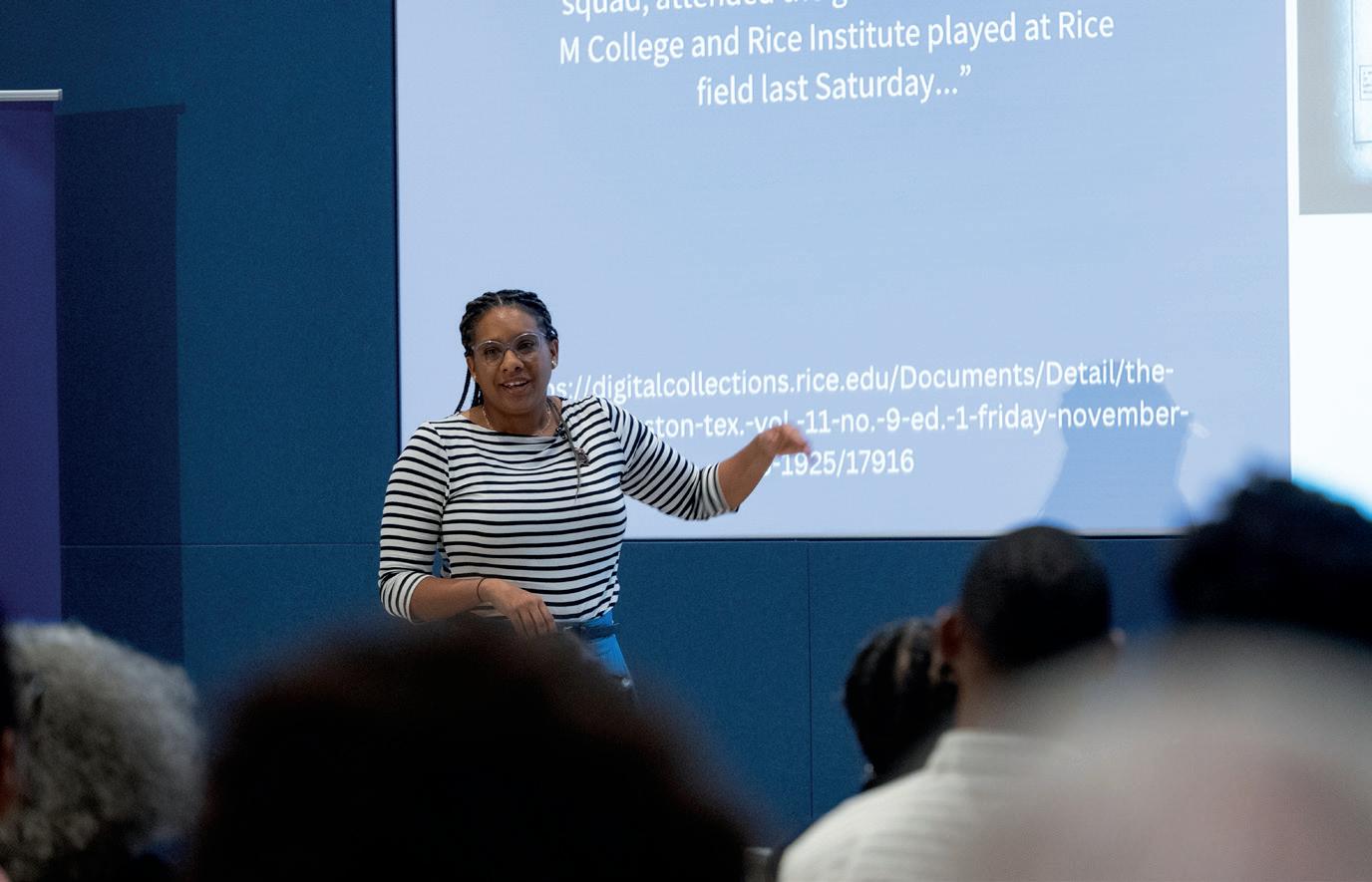

Enes Kanter Freedom, a former NBA player, human rights activist and Nobel Peace Prize nominee, spoke about his life experiences around the world at Rice Feb. 27.
According to The New York Times, Freedom’s outward focus on democracy started when he publicly called the current president of Turkey, Recep Tayyip Erdoğan, the “Hitler of our century.” Since then, Turkey canceled Freedom’s passport, arrested his father and placed him on a most wanted terrorist list with a $500,000 bounty on his head.
Craig Considine, a senior lecturer in Rice’s sociology department, invited and hosted Freedom to speak at the university.
“Enes’ lived experience is pretty intense … He had his citizenship revoked, multiple international arrest warrants … largely because he’s a human rights activist,” Considine said. “Enes is giving voice to the voiceless, the people that don’t have a platform to speak for themselves, and I think this is really important.”
Freedom said he solely spoke out about the Turkish government until one day, someone questioned how he could call himself a human rights activist while ignoring the plight of Uyghurs in China.
“How can you call yourself a human rights activist when your Muslim brothers and sisters are getting tortured and raped every day in concentration camps in China?” Freedom was asked, he said.
According to Freedom, he knew he had to do something after he spoke to a Uyghur activist and learned about the torture methods, including forced sterilizations and organ harvesting, that human rights organizations said were occurring in the region.
Freedom said that this inspired him to create his custom Freedom shoes. By wearing shoes that told the
stories of movements like #FreeTibet and #FreeUyghurs, he wanted to share people’s stories.
Freedom said he had most people’s support when he only criticized the Turkish government. It wasn’t until he spoke out against the Chinese government that he said he was met with pushback from people around him and the NBA.
Freedom wore his #FreeTibet shoes for his first game back after speaking with an Uyghur activist and was told to take them off; he was informed that he could get banned from the NBA if he didn’t take them off.
“My agent called and said, ‘If you say another word, you’re never going to be able to play basketball again, and you’re 29 years old … You could make between $40 to $50 million.’ I hung up the phone and never talked to him,” Freedom said.
Freedom said he even reached out to other sports leagues like the National Hockey League to bring attention to the Uyghur crisis. While they supported him privately, they did not want to risk losing sponsors and endorsement deals, according to Freedom.
“I asked them one simple question,” Freedom said. “I said put yourself in their shoes. If your mom, sister daughter was in those concentration camps tortured and raped everyday, would you just still take money over your morals?”
Freedom said it is important to do more than just bring attention to human rights violations — action is also necessary. He spoke about his work pushing the Uyghur Forced Labor Prevention Act, legislation that prohibits imported products made with forced labor in the Xinjiang Uyghur Autonomous Region.
“Forget about one — I would have sacrificed hundreds of careers just for this,” Freedom said during the event.
Ashlyn Zhang, a member of the Rice’s women’s basketball team, spoke with Freedom the day before the event, along with the members of the men’s basketball team.
“Speaking with Enes helped me appreciate basketball and sports as a universal language, as a vehicle for bringing people together despite differences,” Zhang, a Hanszen College sophomore, said. “I think it would be beneficial for Rice to continue bringing people like Enes to campus, people whose multidimensional backgrounds can contribute unique and global perspectives, helping students look at things from a wider lens.”
Julie Fette, an associate professor of French Studies, was named a chevalier in the Ordre des Palmes académiques, the Order of the French Academic Palms, by the French Ministry of National Education on Bastille Day, a French national holiday, July 14, 2023.
According to the French Embassy in Houston, the honor is given as an acknowledgment of an “individual’s merit, talent, and exemplary efforts” in providing education on French culture.
Fette said that she pursued French studies in graduate school because of its interdisciplinary nature. Her dissertation examined racism and antisemitism in French professions such as law and medicine, which turned into her book “Exclusions: Practicing Prejudice in French Law and Medicine, 1920–1945.”
“[That] was a time in France where there was a lot of immigration. There were nonFrench people who wanted to be doctors and lawyers,” Fette said. “The French decided ‘Well, maybe we [don’t] want naturalized citizens to be doctors or lawyers.’”
Now, Fette is teaching a course about French children’s literature and the
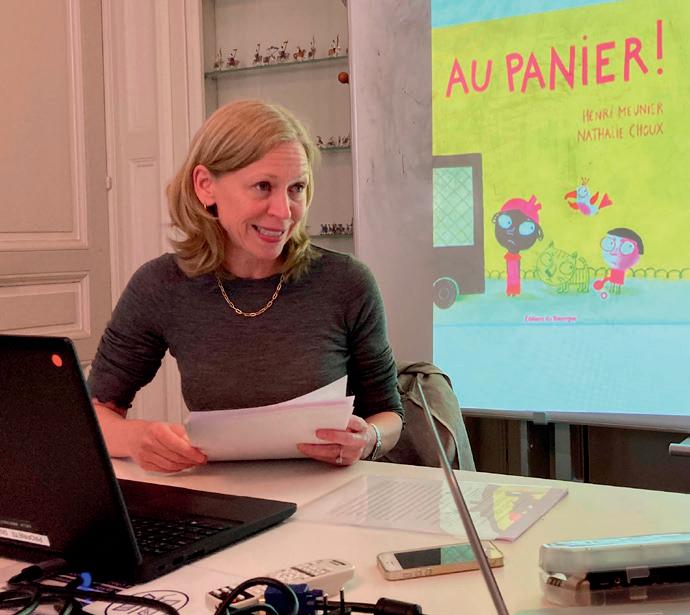 COURTESY JULIE FETTE
COURTESY JULIE FETTE
introductory class in French society and culture. Fette said she is working on a book about how gender is represented in contemporary children’s literature.
“My hope was that I would find that there would be some modernity and some good change and great representations of equality, but I’m finding that it’s not yet there,” Fette said. “I don’t think it’s particularly French … I think if I took a cold hard look at American children’s literature, I would probably find some similar things.”
Editor’s Note: This story has been cut off for print. Read the full article at ricethresher. org.
When the former Student Association president introduced a new constitution in April 2023, the Senate was ready. The document passed the deliberative body with just one no vote, then received 55% approval in a 48-hour special election with barely 10% turnout.
SA leaders declared victory, but a particularly attentive student caught a glaring discrepancy. The constitution at the time required two-thirds of students to approve amendments with at least 20% of the undergraduate body voting, neither of which the hasty special election met. The student filed a complaint, and the University Court unanimously agreed. The new constitution was overturned.
In November 2023, the Senate again passed a series of strikingly similar amendments. SA leadership decided to wait until the regular election to seek student body approval. This time, 36% of undergraduates voted on the amendments, 83% of them in favor. With those boxes now checked, SA leaders declared victory.
But there was another problem. The ballot contained a bulleted list of “major changes” to the constitution, none of which included the most notable — and the most dangerous: Future constitutional amendments can pass with a simple majority without any minimum threshold on voter participation. Quick, low turnout special elections for power-grabbing
GUEST OPINIONreferendums could become the norm. The ballot twisted distressing changes into something palatable, correctly trusting that students would not take the time to read the convoluted documents.
The day after voting opened, a particularly thoughtful student filed a complaint with the University Court.
“This is now the second time the student association senate has tried to subvert the will of the people they claim to represent,” the unnamed complainant wrote. “Last year they ignored the results of a properly run election and passed a similar
Last spring, the SA tried to push a new constitution through a quiet special election. This time, they passed it right under our noses.
amendment that did not get enough votes. When that failed they misrepresented the content of the amendment in order to pass an amendment that consolidated power in the hands of fewer people.”
This student is completely correct. Last spring, the SA tried to push a new constitution through a quiet special
election. This time, they passed it right under our noses.
The ballot should have directly stated the dangerous changes the SA proposed. Instead, it advocated for it.
SA leaders should have fought voter apathy and informed students about the proposals. Instead, the unnamed student alleged that they took advantage.
We hope the University Court once again overturns this series of amendments. But regardless of the outcome, incoming SA leaders must learn from this complaint.
To be clear, these last two referendums have been plainly undemocratic. The SA sought to increase its own power. The first time, they tried a quick, low-key election that obviously broke their own rules. The second time, they allegedly sought to misrepresent the changes on the supposedly neutral ballot.
The new executive board members all said they would focus on connecting with the student body. This includes transparency, and it includes honesty. As we noted before the election, we do need a new constitution, and some of these amendments are strong. We urge the new executive board to develop a proper governing document with robust student input and a clear, fair ballot.
When it comes to the constitution — the foundation of student governance at Rice — we can accept nothing less.
Editor’s Note: This is a guest opinion that has been submitted by a member of the Rice community. The views expressed in this opinion are those of the author and do not necessarily represent or reflect the views of the Thresher or its editorial board. All guest opinions are fact-checked to the best of our ability and edited for clarity and conciseness by Thresher editors.
In view of the deafening silence coming from Rice’s upper leadership, I want to bring my opinion about an incident to the broader Rice community, and put it in the context of the Rice Code of Conduct.
On Thursday, Feb. 15, I attended a presentation by Antonio Neri, Chief Executive Officer of Hewlett Packard Enterprises. The presentation was organized by the Rice Center for Engineering Leadership and was attended by approximately 200 guests.
Some of the guests chose that opportunity to loudly express their opinion contrary to HPE activities in Israel. They
screamed the usual themes of genocide, “from the river to the sea,” and similar phrases that have become quite common. Many attendees, including guests from HPE and myself, felt intimidated and threatened by these chants and by the protesters’ attitudes, body language, tone of voice and words. This was certainly not the venue, nor the way to express an opinion about war in Gaza. In public discourse about similar incidents at Harvard University, the University of Pennsylvania and other schools it became clear to me that these type of slogans (“from the river to the sea,” Israel genocide) are not freedom of speech, but are really hate speech.
The silence from Rice leadership, from the president down to the deans and department chairs, is deafening. What happened to the promise to protect Rice students from harassment and threats? Or is Rice leadership only concerned with the perception of free speech and not with the implications of hate speech?
I understand that the matter was referred to the Rice University Police Department. This is a good step but it does not replace academic and administrative measures that Rice should take against students and student associations and clubs who organize and participate in these demonstrations and blatantly break the Code of Conduct. I expect that hate speech will not be tolerated, and that stark disciplinary action including expulsion or suspension would be imposed on those who ignore it. This is an institutional matter, and I wait for an institutional reply from the Rice president, provost and other authorities.
Sergio Kapusta ADJUNCT PROFESSOR, MATERIALS SCIENCE AND NANOENGINEERING

From Grammarly and Quizlet to SparkNotes and Spotify, artificial intelligence is now a major feature of nearly every website — and the archives of Fondren Library are no exception. The use of AI has been a notoriously hot-button topic for the last few years, involved in artist exploitation debates and the terms of the Writers Guild of America strike, but in the Woodson Research Center, its role has been to facilitate greater ease and expediency in many of their preservation and transcription processes.
In the Woodson Research Center, AI has made possible a new digital collections website, which launched in May 2023. Norie Guthrie, the archivist and special collections librarian, said that Woodson staff previously used the “D space” — now the Rice Research Repository — where they would send audio files to an off-campus service to transcribe, edit and upload the returned PDF. With AI, this is expedited: Transcribing hours of audio now takes only 10 minutes, when previously the process had taken days.
“We can push a button and then it creates a transcript. It is very helpful for audio because audio transcription takes time and this makes it so that the process can be a lot faster,” Guthrie said. “It’s a lot more userfriendly, and it’s a lot easier on us so we can be more efficient with our work.”
Now, the most laborious part of the audio transcription process is cleanup and correction of the completed transcription — for example, correcting the spelling of Wiess from “ei” to “ie” every time it is mentioned.
AI has also been utilized by students in Fondren-associated research projects. Zoe Katz, a Will Rice College senior, applied
to the project through Fondren Fellows, a year-long program through the library that provides research opportunities for Rice undergraduate and graduate students.
“I applied because I kind of want to go to grad school and I was interested in seeing what research options they had. They had one about topic modeling, which is a subfield of computational linguistics,” Katz said. “I’m a linguistics and computer science major, so I was really interested in how both of those two topics would overlap.”
Topic modeling is a type of statistical modeling that uses unsupervised machine learning to identify clusters or groups of similar words within a body of text. This text mining method uses semantic structures in text to understand unstructured data without predefined tags or training data.
Katz chose to focus her project on using OCR, or optical character recognition, to convert old issues of the Thresher from PDFs into text-searchable versions. OCR recognizes text in scanned documents to convert a physical document into an accessible electronic text version. Due to her experience writing for the Thresher, Katz understood the need for an easily searchable database of past publications both for student journalistic research and historical value. Because the project was only finished early last semester, Fondren Fellows is still in the process of publishing the data, but her work will soon be available for public access.
Steven Loyd, the processing assistant at Woodson, uses ChatGPT to write Python scripts to perform basic tasks. He combines his knowledge of algorithmic thinking and ability to conceptualize where a coding program would be useful with AI’s code-writing abilities. Often the code he collaborates with ChatGPT on is used to
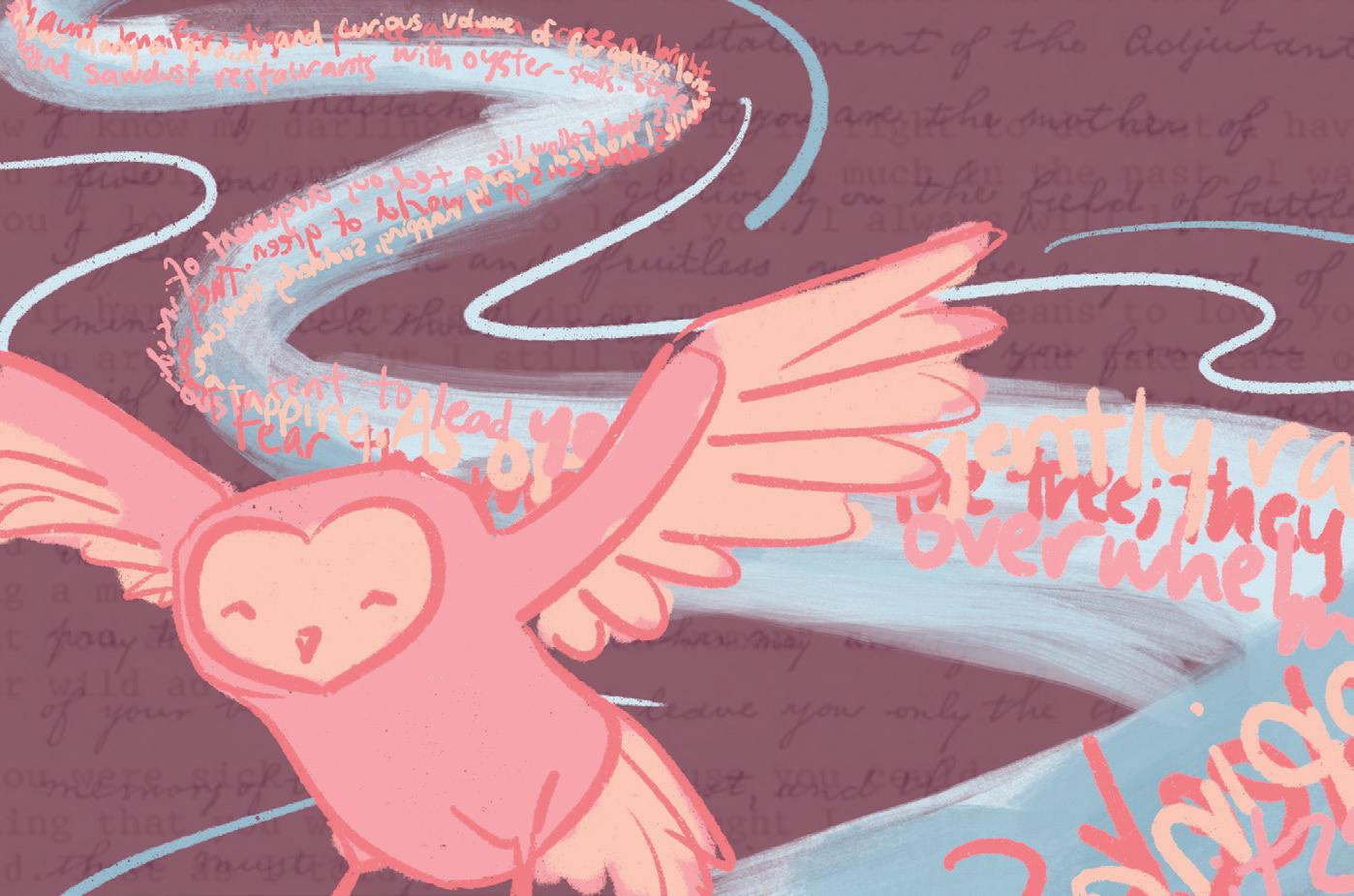
automate online chores, such as counting, organizing and renaming file types and folders based on contents and other variables by thousands or tens of thousands of files at a time.
“These are tasks that humans could do with enough time, but there is no shortage of things at the Woodson that only humans can do, so having useful code on hand saves time for more challenging, provocative work,” Loyd wrote in an email to the Thresher. “Ultimately, for our purposes at the archive, ChatGPT is a very helpful tool that nonetheless requires significant human input to function usefully … As far as the future goes, I see AI as a technological advancement akin to the internet, new storage formats, etc., that help archivists process materials more efficiently and reliably.”
The Fondren Library Artificial Intelligence Task Force was created to discuss possible limitations around AI use in issues of academic judgment, but also how it can be better utilized in research and professional life. Their meetings are open to students, who can contribute to the discussions as Rice continues to grapple with the questions of ethics surrounding the use of artificial intelligence. These discussions will hopefully help find ways to use AI to support rather than supplant human experience and learning, Loyd said.
“Archives, I think, are ultimately humanistic, requiring [an] informed, passionate understanding of given materials and the cultural context surrounding them,” Loyd wrote. “I don’t foresee archival AI rising above its station as a timesaver to anything with actual responsibility.”
Isabella Avilez is a problem solver. As co-president of Rice Escape, she got the club back on its feet after it was felled by the COVID-19 pandemic. As a mechanical engineering major with a passion for renewable energy, she attempts to find ways to power the world’s technologies while leaving space for a sustainable future. And as a friend, she’s an expert at turning a rough week into a pleasant smile.
“One time during a really hard semester … I was talking to her about what I was going through, and then when I came back [to my dorm] she left a little note under my door with a really sweet letter,” Abi Parthasarathy, one of Avilez’s fellow Peer Academic Advisors, said. “Having that gesture just meant a lot to me at that time.”
Avilez hails from a family of puzzlers and board-gamers. She tried her first escape room on a family trip to Hungary when she was in high

school. Her family happened to be staying directly across the street from one, so Avilez tried it on a whim; she was hooked after that first escape.
“I just loved it,” Avilez, a Sid Richardson College senior, said. “I love that aspect where you’re trying to break out, that fantasy world kind of thing … I think we actually came back the next day and did another one.”
Avilez said her family now tries a new escape room every time they travel, within the U.S. and abroad. She has solved over 20 escape rooms worldwide since her first one in Hungary. According to Rice Escape copresident Andrew Kim, Avilez puts some of the pros to shame. “I consider myself a big escape room fanatic, but I cede the title to her; she’s definitely the biggest escape room junkie you can find,” Kim, a Lovett College junior, said.
Avilez joined Rice Escape soon after matriculating in the fall of 2020, one year after the club’s founding. As head game host, she helped orient teams to each room before administering their puzzling adventures, and she became co-president of the club in the spring of 2022. Avilez said putting together the rooms can be as tough as solving them.
“It’s a balance of challenging but also doable,” Avilez said. “You don’t want a room that’s impossible, because then it feels like a cheap shot, and the people leave like, ‘Ugh whatever,’ but you also want it to be challenging … to keep people mentally engaged.”
Planning and putting together rooms, submitting budget requests and leading meetings are but a few duties Rice Escape
co-presidents are charged with, but those who work alongside Avilez say she goes above and beyond the expectations of her role to ensure Rice Escape thrives.
I consider myself a big escape room fanatic, but I cede the title to her; she’s definitely the biggest escape room junkie you can find.
Andrew Kim RICE ESCAPE CO-PRESIDENT
“Rice Escape particularly struggled a lot after COVID because as an escape club, the in-person aspect is very fundamental,” Kim said. “Isabella and I worked together to revive that culture that existed before COVID, and she has been super instrumental in putting her entire effort into reviving what is really a passion project.”
Avilez said she loves that Rice Escape lets her step into new and fantastical worlds.
“I’m a mechanical engineer. It’s very logical, very analytical, very straightforward, very cut and dry,” Avilez said. “An escape room like Submerged Seacrets … is a different world, a different thing and something very different than my own life, and I’ve always loved that.”
While she is usually the one to come up with solutions, Avilez also said she enjoys collaborating with her peers to engineer problems for other people to solve.
“I really love the creative aspect of it and all the wonderful ideas, really cool ideas that people have,” Avilez said. “Some people are like, ‘Let’s put out this puzzle,’ [and I would] have never thought of that kind of thing.”
Avilez brings the same passion and care to her studies as an engineer, colleagues say. In 2022, she designed a harness that uses pulleys to keep weight off of wrists plagued by carpal tunnel syndrome and uploaded the blueprints to Creative Commons for public use. Her senior design team repurposes decommissioned wind turbine blades into furniture, mini-libraries and garden plots to be dispersed throughout the Houston community.
Mechanical engineering professor Laura Schaefer said she admired Avilez’s selfless disposition and restless drive, which distinguished her from some 80 peers in a large MECH 200 class.
“There were a lot of great students in the class,” Schaefer said. “But Isabella came to office hours, she helped out her fellow students, she was very active in class, she obviously cared about the material a lot, she was one of those students who really stood out.”
Schaefer taught Avilez once more in MECH 477, a special topics class on renewable energy. When Rice senior executive director for sustainability Richard Johnson visited the class to discuss student projects aimed at improving Rice’s energy efficiency and sustainability, Avilez was all ears.
Editor’s Note: Andrew Kim is a Thresher Backpage editor.
This article has been cut off for print. To read more, visit ricethresher.org.
Most professors can’t say that they grew up with their research topics. But José Negroni Cicerchia isn’t like most professors.
“I was raised by parents who were pro-democracy activists,” Cicerchia said. “Through that, having been born and reared in Argentina, I myself was an activist in my own right, with Amnesty International and the Mothers of the Plaza del Mayo.”
Cicerchia is a lecturer in the Department of Modern and Classical Literatures and Cultures, focusing on autofiction — fictionalized third-person autobiographies that proliferated in Argentina after the country’s military dictatorship was ousted in 1983.
“It’s a canon that was developed by the children of those who either disappeared or [were] persecuted in Argentina during the dictatorship,” Cicerchia said. “I think that these texts are very significant, because they are contemporary to what happened, whether it was Brazil, Argentina, Chile, Uruguay [or] Bolivia, it was not far away or long ago.”
For Cicerchia, his area of study is crucial to shaping nuanced viewpoints, no matter the era.
“The institutions in this country, and all over the world, are holding, but they’ve been challenged,” Cicerchia said. “I think it’s important to take a look at what happened with Latin America in the 20th century.
“I feel as if these courses provide a useful overview of what took place and what could happen in the future,”

Cicerchia continued. “That being said, my wish is that students will not have to live through coup d’états and ominous authoritarian regimes.”
Cicerchia’s enthusiasm is a key component of his classroom. Hayden Beck, a student in Cicerchia’s SPAN 332: Approaches to Hispanic Literatures course, said that this enthusiasm is infectious.
“He brings this certain energy that’s just over the top,” Beck, a Martel College sophomore, said. “Even if I’m tired, going into that class, seeing someone who’s as passionate as they are about whatever they’re talking about … it’s kind of invigorating.”
Beck said he appreciates Cicerchia’s commitment to getting on his students’ levels, from taking them for meals to checking in.
“He takes students out on his own dime to different restaurants within the Rice area,” Beck said. “He actively emails students and gets a group of students together so we can go practice Spanish … It’s generosity like that that really stands out to me, and I think it’s pretty incredible.”
Lauren Verthein, another SPAN 332 student, also noted that Cicerchia’s closeness with his students makes his courses unique.
“He takes the time to get to know our interests and checks up on us when he knows that we are going through something difficult in our lives outside of class,” Verthein, a McMurtry College sophomore, wrote in an email to the Thresher. “When I sprained my ankle and was on crutches he would check in with me every class, and [he] even gave me a book about an inspiring story of an athlete who used his injury to find new opportunities in life.”
For Cicerchia, these acts of generosity are all part of preparing his students for the future.
“I’m looking to ensure that my students grow into very well rounded individuals who become experts on Latin American literature,” Cicerchia said. “Taking these courses — whether in Latin American film, the effects of neoliberalism, approaches to Hispanic literature, post-dictatorial traumas [or] autofiction by the children of the disappeared — will make them huge assets to the Rice community at large and also to the outside world.”
chooses you at Sid, you can live on campus. If you are chosen by the wheel at Duncan, you’re out.
Housing Jack, Eligibility Jack, Room
Jack or The Bump — every college has its own lingo for the same daunting event of deciding which students get to live on campus the following school year. Perhaps more importantly, each college also has its own method of determining who is part of this fortunate group. With varying rules and point systems using everything from pingpong balls to pints of ice cream, the housing process inevitably produces entertaining delivery methods for the final blow of getting jacked off campus.
The Wheel of Doom
This wheel is analogous to the spinning wheel of death for your loading browser: colorful, virtual and prolonging an already painstaking process. Duncan College and Sid Richardson College subscribe to this method, projecting an online spinner bearing the names of students wishing to live on campus in their commons. One unlucky individual must then spin the wheel over and over until all beds are assigned. If the all-powerful wheel
The Group Jack
Getting jacked off is more fun with company. Brown, Wiess, Martel, Hanszen and Lovett Colleges allow students the option of entering eligibility jack in pairs. At Jones, Will Rice, Baker and McMurtry Colleges, students fly solo. Duncan allows “buckets,” where students can enter in a group and give it a fun name to watch spin on the wheel. At Sid, students must find a partner with whom to enter the jack process or they are automatically off-campus.
The Ice Cream Consolation
Nothing says “sorry, you have to pay rent in Houston” like a pint of ice cream. This year, Brown purchased pints to give to off-campus students and ended up having enough for everyone at Eligibility Jack who wanted ice cream. Sid also sweetens the process. Each pair gets a pint with a number corresponding to their assigned slice of The Wheel.
Editor’s Note: This article has been cut off for print. To read more, visit ricethresher.org.

Popular ice cream flavor, for short
Preserves, in a way
Read, as a bar code
Small stream
Before surgery, briefly
“Hmm...I doubt that”
2012 Best Picture
Last Greek letter
Boba of “Star Wars”
Philosopher who lay the foundation for contemporary feminism with “The Second Sex”
Starbucks offering
Serious
Wine partner
Fix, as laces
Activist Truth who asked “Ain’t I a Woman”?
Messed up Olympian ruler ___ Clean (household brand)
Minuscule margin
Alpha males, perhaps
Worms’ abode
“Sex Education” actor Butterfield
Hammer handler
Aromatic seed
Theorist who asserted that “Feminism is for Everybody”
Fountain drinks
Dry as a desert
HIV prevention option Pig in “Charlotte’s Web”
Scholar who coined the term “intersectionality”
Garfield’s pal
Make pigtails, perhaps Georgetown athlete
Factory “They’re ___ __ get me!”
Stadium cheers They are in abundance on X “Revolutionary Road” writer Richard Waterproof cover
Sign of cancer?
Add to the staff
One of Chekhov’s “Three Sisters”
Not as transparent
Animal trail
Battle groups
Lascivious look
Dress (up)
Roomy
Endure pain
Professional cook
Poker pot starter
Musical symbol
Competed (for) Burden
Kept the party popping, briefly Addict’s program, for short
clean
before a subscription payment
singer, perhaps
Robin
ending
7-Up alternative
Second attempts
Development site?
Prefix meaning “peculiar”
Lively tune
Suffragist Carrie Chapman ____ Spanish greeting Yesterday, in Cuba
Some privileged Americans, for short Street, in Portuguese
 KRISTAL HANSON THRESHER STAFF
KRISTAL HANSON THRESHER STAFF
Grab your cowboy boots and saddle up — the Houston Livestock Show and Rodeo is back for 20 days of action. From Feb. 27 to March 17, the rodeo will transform NRG Park into a yee hawin’ haven of competition, food and music. All it takes is a short ride on the Metro to pop that Rice bubble and experience what Houston has to offer.
Tickets
If you missed out on snagging a free ticket from the Rice Program Council, try
BRYAN MENDOZA / THRESHERyour luck getting a free unclaimed RPC ticket Friday, March 8 from noon to 1 p.m. in front of the Rice Memorial Center’s Grand Hall. Tickets to the grounds start at $20. If you’re aiming for the full rodeo experience, including the heart-pounding events and musical entertainment, you’ll need to pony up at least $25.
RODEOHOUSTON
This super series tournament-style competition features riding, wrestling, roping and racing of horses and livestock. Make sure to catch the ultimate challenge, the Mutton Bustin’, where kiddos are
placed on a sheep that shakes them off. In addition to classic rodeo events, you can visit the rodeo version of a science fair. Take a gander through a petting zoo, a miniature livestock exhibition called “We’re Small Y’all Barn,” a birthing center and udderly exciting live demonstrations of milking at the “Milking Parlor.”
The rodeo has a star-studded and genrespanning lineup of artists to perform in the NRG stadium including pop, country, hip-hop, EDM, Latin and rock artists. Luke Bryan, the man behind country hits like “Country Girl (Shake It For Me)” and “Play It Again,” takes the stage on March 7. If country isn’t your style, EDM artist Major Lazer will perform March 8 and Nickelback, a Canadian rock band with hits like “How You Remind Me” and “Rockstar,” will be on stage March 13, two days before The Jonas Brothers play (and are sure to pack the stadium with millennials). The rodeo then returns to its roots, with country legend Eric Church closing the festivities on March 17.
Grub
If you’re tired of the same servery food, the rodeo’s got your taste buds covered. Loosen your belt buckle for pickled pizza on a stick from Swain’s Pizza on a Stick, deep fried bread pudding from Cajun Cowboy or deep fried chicken donut sandwiches from Get Fried. Anything is carnival food when it is on a stick or deep fried, ideally both. Of course, classic southern eats like brisket and burgers are also on the menu — after all, the rodeo hosts the World’s Championship Bar-B-Que Contest.

COURTESY SONY PICTURES
HAMZA SAEED
THRESHER STAFF“Madame Web” is terrible. This movie has no redeeming factors. It isn’t even worthy of a fantastical, provocative introduction. It just sucks.
Cassandra Webb (Dakota Johnson) is a paramedic and an orphan. Her mom was shot in the Amazon by Ezekiel Sims (Tahar Rahim) while they were looking into magical Peruvian spiders that turn some of the locals into spider superhumans. She has begun to see visions of the future. While on the New York City subway, she sees a vision of some teenagers (future spider-women) getting killed by Sims. Sims wants to kill these teens because he is seeing visions of the teens killing him. He has no other motivations as a villain. Cassandra kidnaps these children and then goes on random hijinks in the city trying to keep the kids away from Sims, who is only referred to as “ceiling guy” (he can climb on ceilings). The rest of
Midterms got you burnt out? Work-life balance tipping more to the former end? Check out some of these clubs for some social enrichment and cultural edification.
The Rice Players
The Rice Players is an all-student theatre troupe, established in 1921 as the Rice Dramatic Society and reborn in 1951 under their current name. They put on a show about once a semester, and they host Play in A Day on the first weekend of each semester where participants are tasked with producing an entire play over the course of a single weekend. Head to Hamman Hall to catch one of their shows — free of charge — or look out for their Play in a Day announcements at the beginning of the semester.
Rice RAW Photography
Madame Web, for the blissfully unaware, is a supporting character in the Spider-Man mythos, often being depicted as an elderly clairvoyant mutant that uses her telepathic and psychic abilities to … tell Spider-Man and friends to do stuff. Through sensual ASMR ads to trashing the movie in a variety of interviews, she clearly did not care about promoting this film. To be fair, she also did not care about actually acting in it, or at least it seemed so. What a flat, depressing and downright horrifying performance. I am not sure if anyone has ever cared about anything less than Johnson cares about “Madame Web.”
the movie is her playing keeping the kids (who bond as a family, sort of?) away from Ceiling Guy.
None of the plot events in this movie make sense, are interesting or connect to each other whatsoever. Madame Web performs CPR on a conscious person for some reason. Ceiling Guy only ever gets hurt by getting hit by Madame Web in a taxi, Madame Web in an ambulance and the Pepsi Cola sign. Somehow, the peptides in the spiders allow Madame Web to split herself into three ghost-like projections at the climax of the movie. There’s this tribe of magic spider people in Peru who use a spider bite to induce labor in Madame Web’s mom. Madame Web is a wanted felon, we think, but it never gets brought up at the ending of the movie. Madame Web also probably killed several people.
Distributor: Sony Pictures
Johnson “stars” as Madame Web.
Actually, everyone’s acting is terrible. Almost all of the characters are just the same person, except for Sydney Sweeney. Sweeney is in the movie, technically, as Julia Carpenter, a nerd version of Spider-Woman. Except none of the future spider-women actually get their powers in this movie, they’re just dead weight. The acting gets worse the deeper you get, not unlike a car crash. Atrocious, but sometimes you just can’t look away. This movie is straight garbage. This cannot be emphasized enough. Art used to be subjective, then “Madame Web” came out and set a new bar: on the ground. The only reason we are giving it half a star is because it is not technically the worst thing to ever exist (“Winnie the Pooh: Blood and Honey,” documented war crimes, etc.). The best part of this movie was the fact that it ended.
Also called Rice RAW, this club is dedicated to bringing together photographers of all skill levels. They organize workshops and photoshoots on campus so that members can develop their skills and reach the next level.
BASYK
BASYK Dance Club is a hiphop dance club specializing in K-pop choreography. BASYK has performed at several Rice events, including the Chinese Student Association Lunar New Year Gala and their annual showcase CYPHER. BASYK hosts weekly practices, where dancers of all skill and experience levels are welcome to join.
Mariachi Luna Llena
Mariachi Luna Llena is a studentrun mariachi band at Rice. They’ve been playing for over a decade and have performed at venues as impressive as the Houston Rodeo and Minute Maid Park for the Houston Astros. Attend one of their many performances and listen in, or join the band to make some music yourself and earn some extra cash on the side.
Rice Cinema Club
Rice Cinema Club is a lowcommitment club centered around film appreciation. They regularly host movie showings and are dedicated to showcasing films of diverse styles, perspectives and techniques. Visit a showing for a movie that catches your eye and discuss the cinematography with fellow film nerds.

It’s March already, meaning it is time to examine the Academy Awards, an event sure to be full of awkward moments, baffling losses and confounding decisions, once again hosted by Jimmy Kimmel for some reason. However, the 96th Academy Awards Ceremony has something special going for it — this past year was an excellent one for film. It will be difficult in many categories for the Academy to make a bad choice, though there certainly are some categories the Thresher A&E section feels strongly about. Here are our picks for who will win at the 96th Annual Oscars and who actually deserves it.
Actor in a Leading Role
Who Should Win: Jeffrey Wright, “American Fiction”
Who Will Win: Cillian Murphy, “Oppenheimer”
This category is one of the hardest to pick. There really is no bad choice here: Every single nominee produced incredible performances, melding seamlessly into their roles and creating some of the best movies of the year. Jeffery Wright as best actor is definitely a hot take — “American Fiction” did not make cultural waves the way many of the nominated films have. But with last year’s Oscars performance categories awarding wins to long underappreciated actors and actresses, it feels
AMBER WANG / THRESHER
right to have one more.
Wright has quietly been part of many incredible films, just this year carrying multiple scenes in “Asteroid City.” In “American Fiction,” Wright essentially plays two characters, each commenting on the other. It is far beyond time for Jeffry Wright to get his flowers. However, the academy will likely grant the role to Cillian Murphy for his haunting performance in one of the largest movies of the year. Murphy embodied Opppenheimer through and through so, while not a bad decision, it might not be the best. — Basma Bedawi
Actress in a Leading Role
Who Should Win: Lily Gladstone, “Killers of the Flower Moon”
Who Will Win: Lily Gladstone, “Killers of the Flower Moon”
The most difficult to predict of the acting categories, this category will come down to the two stones: Emma Stone and Lily Gladstone. While Stone has won Best Actress at the BAFTAs and the Critics Choice Awards, Lily Gladstone won at the Screen Actors Guild, which is exactly what Michelle Yeoh had won when she won in this category last year. Stone is a previous winner as well (for “La La Land”), and the passion to award her likely won’t be as strong as it will be for Gladstone, who has already made history
as the first Indigenous woman nominated in the category. Both are very worthy, though, so either way one of the best performances of the year will be awarded here. — Arman Saxena
Best Picture
Who Should Win: “Killers of the Flower Moon”
Who Will Win: “Oppenheimer”
It is rare that I have seen all of the best picture nominees before they are announced, and even rarer that I actually enjoy everything that has been nominated. I do not think that the academy can pick a film that I dislike, though I certainly feel stronger about some films than others.
“Killers of the Flower Moon” is a film I have written about at length, both in this article and in my original review, but is still deserving of praise for being the film from last year that I am still wrestling with. The lengthy runtime gives the film enough time to properly outline a tragedy in a way both reflective of the U.S.’s ugliness and Scorsese’s own commitment to violence in his previous works, summarized wonderfully in arguably the most poignant ending of 2023.
The historical importance of the film is what makes it the best candidate to be canonized by the Academy, as it feels reflexive in a way few Hollywood productions are. However, “Oppenheimer” is seemingly unstoppable, and for good reason, as it manages to draw comparison to big budget action films despite the fact it is almost solely composed of conversations. The film’s magnitude and scale creates a similar impending dread in the audience while the sharp dialogue keeps the film quick on its feet, making it a much more accessible and likable film than “Flower Moon.” While I don’t believe it is as impactful or important, it is certainly worthy of the win it will likely get, as it is similarly reflexive and emblematic of 2023 in film. — Jay Collura
Editor’s Note: This article has been cut off for print. Read the full story online at ricethresher.org
Writing (Original Screenplay)
Who Should Win: “Anatomy of a Fall”
Who Will Win: “Anatomy of a Fall”
Writing (Adapted Screenplay)
Who Should Win: Jonathan Glazer, “Zone of Interest”
Who Will Win: Christopher Nolan, “Oppenheimer”
International Feature Film
Who Should Win: “Monster” (not nominated)
Who Will Win: “Zone of Interest”
Cinematography
Who Should Win: Robbie Ryans, “Poor Things”
Who Will Win: Hoyte van Hoytema, “Oppenheimer”
Production Design
Who Should Win: James Price, Shona Heath, and Zsuza Mihalek, “Poor Things”
Who Will Win: Sarah Greenwood and Katie Spencer, “Barbie”
Documentary Short
Who Should Win: “The ABCs of Book Banning” Who Will Win: “The ABCs of Book Banning”
Makeup and Hairstyling
Who Should Win: “Society of the Snow”
Who Will Win: “Poor Things”
Sound Who Should Win: “The Zone of Interest”
Who Will Win: “Oppenheimer”
Original Score
Who Should Win: “Oppenheimer”
Who Will Win: “Oppenheimer”
Visual Effects
Who Should Win: “Godzilla Minus One” Who Will Win: “Godzilla Minus One”
Editing
Who Should Win: “Anatomy of a Fall”
Who Will Win: “Oppenheimer”
Costume Design
Who Should Win: “Poor Things”
Who Will Win: “Barbie”
Documentary Feature
Who Should Win: “20 Days in Mariupol”
Who Will Win: “20 Days in Mariupol”
Animated Short
Who Should Win: “Ninety-Five Senses”
Who Will Win: “Letter to a Pig”

There have been a number of attempts to do justice to Frank Herbert’s massively influential novel, “Dune,” over the years. The most famous of these attempts include a David Lynch adaptation, notably edited in post to the point where the director himself allegedly asked for his name to be removed from the final product, and an attempt by director Alejandro Jodorowsky to make an over 10-hour version in the ’70s. Denis Villeneuve’s “Dune” and “Dune: Part Two” finally succeed in conveying the vastness and wonder of Arrakis by giving one of cinema’s modern auteurs control over a property that he had already designed storyboards for as a teenager.
For Villeneuve’s “Dune” movies, he
split the original book in two. “Dune” followed the fall of House Atreides, one of the great royal families, and saw Paul (Timothée Chalamet) left in the deserts of Arrakis, the planet his family had been given by the emperor. He soon met the Fremen, a group of people indigenous to Arrakis, whom he begins to travel with as the Harkonnens, the family who took the planet from House Atreides, take control of Arrakis. While the first film was limited by its need for the source material’s world building and character development, the extensive set-up pays off in “Dune: Part Two” for an incredible viewing experience.
One of the most noticeable things about the film is cinematographer Greig Fraser’s stunning visuals, truly something that should be experienced on the biggest screen available.
Anyone who has seen “Dune” can tell you how great Arrakis looks, with primarily orange tones saturating the world. However, perhaps the most visually exciting moments are on Giedi Prime, the homeworld of the Harkonnens. Giedi Prime is shot in black and white, a decision Villeneuve said in an interview with Moviefone was inspired by the original book’s emphasis on the impact of the world around populations on their psyche and political systems. Villeneuve and Fraser took this concept and applied it to the Harkonnens, creating a world where “instead of revealing colors, the sunlight was killing them.” Rather than shooting in simple black and white, Villeneuve and Fraser shot in infrared to create something more eerie and otherworldly.
Aside from the cinematography, the film’s looks are enhanced by superb costume and set design, with elements drawing from organic structures and creating a very unique look across the film. The combination of the ancient with the futuristic adds to the visual identity of “Dune.” Countless material textures are utilized to create a sense of depth in the sets and reality in the costumes. This attention to detail is further seen in the infamous sandworms, which look monumental and dangerous.
Director: Denis Villeneuve
is remarkable, with Chalamet at his most commanding. Chalamet and Zendaya, who stars opposite him as Chani, a Fremen, have strong chemistry that is a focal point of the film as Paul navigates his connection to a Fremen prophecy that names him as their chosen one, to both his and Chani’s dismay. “Dune: Part Two” rejects the classic “chosen one” narrative, as Paul fights against building religious fervor around his perceived role as a savior. The movie does a particularly good job of deconstructing how religious fanaticism can grow and the dangers of it. Javier Bardem’s Stilgar is essential to understand this growth of religious extremism with his belief in Paul as the Lisan Al Gaib, the Fremen’s prophesied savior figure, initially treated with humor before it grows to become disturbing. Another standout among the film’s performances, Austin Butler is a chilling villain as Feyd Rautha, a cunning and brutal foil to Paul Atreides.
In addition to just how eye-catching of a film “Dune: Part Two” is, the acting
A well-paced movie that builds to a satisfying conclusion while nicely setting up for a third installment, “Dune: Part Two” is an visually spectacular film that begs to be seen in theaters. Through his two “Dune” movies, Villeneuve finally does justice to the book that inspired “Star Wars” and countless other classic works of science fiction.
Reckling Park and the Owls hosted some of the country’s best players this past week, starting with a 16-4 loss against the defending national champions, Louisiana State University, on March 5, followed by a three-game series against Stanford University, ultimately getting swept.
On Wednesday night, No. 2 LSU swiftly built a commanding 9-0 lead over the Owls in the first three innings. The Owls scored three runs in the third inning, with senior infielder Nathan Becker, junior infielder Manny Garza and graduate outfielder Kyte McDonald each notching two hits on the game. Despite their efforts, they faced a significant challenge to close the gap.
The Tigers increased their advantage with two runs in the fifth inning and then further extended their lead by scoring five runs in the seventh. Following their initial three runs, the Owls could only add one more run in the sixth inning, giving LSU a 16-4 victory.
This game against LSU drew in 4,610 spectators — the largest crowd at Reckling Park since 2016 when Rice defeated No. 3 Texas A&M University 4-3.
The Owls stayed in Houston to face off against Stanford, which the Owls notably defeated in 2003 to win their first and only national championship. Rice, however,
wasn’t so lucky this time around.
The Cardinal started off the first game by getting five runs in six innings while shutting Rice out. The Owls pulled two runs back in the seventh and eighth inning, but another run by Stanford in the eighth inning sealed the game 6-2 for them.
According to head coach Jose Cruz Jr., the team is still trying to find the best lineup to carry forward.
“I’m just trying to find the most competitive guys I can possibly find to go and make a lineup,” Cruz Jr. said. “I think some of the guys that have played here to start the year did something for me to give someone else a chance. We’re just trying to see who the most competitive guys are and just throw those nine guys out there and see what we can do.”
Saturday’s game was more of the same for the Owls. Stanford took an early lead and continued to keep Rice scoreless all throughout the game. The Cardinal scored all of their eight runs in the first six innings while the Owls were hitless until the fifth inning and scored their only two in the ninth after a two-run home run by senior infielder Pierce Gallo.
In the final game of the series on Sunday, the Cardinal once again got off to first inning lead with two runs, but Rice tied the game quickly in the second inning with a two-run double by junior infielder Treyton Rank. Stanford brought two more
runs in the fifth inning, to which Rice responded by scoring one of their own. The two teams were at a stalemate for the rest of the game until the Owls had an opportunity to take the lead at the bottom of the eighth with the bases loaded. The fireworks, however, stayed silent that night.
“We had the winning run on base at the bottom of the eighth,” Cruz Jr. said. “Next thing you know, we made a bloop into left center that could have been a
really good play [if it was not caught]. That [ball] drops and we’re having a completely different conversation right now.”
The game finished 4-3 in favor of Stanford, sealing the sweep and their 11th straight victory over Rice.
The Owls stayed at home to face Prairie View A&M University on Tuesday, March 5 at 6:30 p.m. They travel to Mānoa, Hawaiʻi to face off against the University of Hawaiʻi at Mānoa in a four-game series starting Friday, March 8 at 10:35 p.m.

Junior infielder Treyton Rank swings against Stanford University. The Owls were swept by Stanford this weekend, marking the 11th straight loss against the Cardinal.
The men’s and women’s tennis squads each played

weekend and both came away with wins. The women competed against No. 69 University of Nevada, Las Vegas in Las Vegas on March 1, while the men took on the United States Air Force Academy at home on March 2. The women traveled out west to play UNLV on their first day and Northern Arizona on their second day, but windy conditions led to the cancellation of the Northern Arizona match. The conditions were already windy on day one, but Rice was able to sweep their ranked opponent nonetheless.
“It was a solid team win today,” head coach Elizabeth Schmidt said. “Conditions were tough with the wind but our team really embraced the challenge and played solid, focused tennis.”
In the doubles matches, graduate student Chie Kezuka and senior Federica Trevisan won their top-court match 6-3, while junior Saara Orav and sophomore Darya Schwartzman won their match on the second court by the same score.
Singles matches were won by Kezuka on court four, Schwartzman on court two and freshman Divna Ratkovic on court three. These wins allowed Rice to defeat UNLV 4-0 and achieve their third sweep of the season. This was the team’s second sweep over a ranked opponent.
The women returned home to face off against Sam Houston State University, sweeping them 4-0 on Tuesday.
The men came back to Houston after the Blue Gray National Tennis Classic and came away with a 6-1 win against Air Force.
On courts one and three, respectively, senior Yasha Zemel and sophomore Kabeer Kapasi won their match 6-3 while juniors Arthus de la Bassetiere and Eduardo Morais won 6-4.
“A solid doubles point; early on, it was pretty neck and neck but I love the fact that the threes jumped to a really strong start,” head coach Efe Ustundag said. “It put some early pressure on the other side.”
The team continued to dominate in singles, with wins at the first, second, fourth, fifth and sixth courts. These wins led to the final score of 6-1 against Air Force.
“It felt like every opportunity we had, we took, which gave us the lead,” Ustundag said. “In singles, I was really happy with a quick 1-2-3 punch. We had a battle at their place last year, so it was good to host them back here and I’m happy with the results.”
The women compete against Sam Houston State University and Southern Methodist University this upcoming week, while the men will have their next matches over spring break on the road against No. 75 University of California, Santa Barbara March 11 and California Polytechnic State University, San Luis Obispo March 14.

Women’s basketball fell to the University of North Texas 63-54 on Saturday, bringing their losing streak to four, their longest of the season, and dropping them to a six-way tie for fourth place in the American Athletic Conference standings only a few days away from the
tournament.
Early on in the season, the Owls were tied for first in the AAC but have gradually slipped throughout the year leading up to the conference tournament.
Prior to the start of the senior day game, guard Destiny Jackson was honored as the only outgoing player in the program.
“I thought the entire ceremony was one to remember,” Jackson said. “I truly felt honored to be recognized for my contributions to this program, and the video itself was spectacular. I thoroughly enjoyed the experience and just feeling appreciated by such a remarkable program here at Rice.”

Although the Mean Green are ranked first in the AAC, the Owls held an even score throughout the first and second quarters, even going up by six in the second quarter before
losing the lead and tying it back up before the end of the first half.
Despite a low-scoring third quarter, Rice was able to take a two-point lead heading into the fourth quarter, which, according to junior center and the game’s leading scorer Sussy Ngulefac, was attributed to strong defensive efforts.
“I felt the flow of [the] game was great throughout,” Ngulefac said. “Our defensive intensity was one of the best all year and that really kept us afloat.”
That momentum, however, completely shifted in the last quarter.
“We let it get away from us in that fourth quarter [by] not hitting some crucial shots and layups,” Ngulefac said. “I think a few defensive miscues led to UNT’s run late in the game and we didn’t really bounce back from it like we should’ve.”
A 9-0 surge followed by a 17-4 run for UNT sealed a fourth straight loss for the Owls who are in a six-way tie for fourth place in the AAC. This means that Rice’s last conference game against the University of Texas at San Antonio on Tuesday, March 5, ongoing at the time of publication, will be a crucial one for the Owls.
“My expectations for us going into
UTSA would be to keep that defensive mentality we had for UNT and [be] urgent on every possession,” Ngulefac said. “Along with that, we just need to shoot a little better as well as being ready for a physical matchup that I believe we can match.”
At the time of publication, a win, along with losses from the rest of the 9-8 teams in the conference, which is possible based on the schedule, could place Rice as the fourth seed and give them a double bye in the conference tournament. A loss, however, along with unfavorable results, would guarantee them at most only one bye.
Reflecting on the last few games of her basketball career at Rice, Jackson hopes to end on a high note and believes the team is ready to face the challenge.
Ngulefac echoed this, believing that the team has the necessary tools to make it far in the conference tournament.
“We need [to beat UTSA] for standings but also momentum and feeling good about ourselves,” Ngulefac said. “As we’ve seen this year, the conference is a fair, tough match every game and [because of that] I’m excited for the tournament. We’re more [than] capable and we’ve always had the tools. This is the time to put it all together.”
basketball drops two to bottom-five AAC opponents
Fifth-year senior guard Travis Evee emphasized how the defense needed to play better for the entirety of the evening.
Rice men’s basketball dropped a pair of games last week, losing 43-65 to Temple University Feb. 28, then 87-66 to Wichita State University March 2. The pair of losses terminated their two-game winning streak, dropping the Owls to 11-18 (5-11 in AAC).
The losses followed a pair of wins the week prior — one of them against the University of Alabama at Birmingham, who ranked third in the American Athletic Conference at the time.
Rice now sits 10th in the AAC standings. After the Wichita State loss, head coach Scott Pera was disappointed with the losses but reiterated his confidence in his team.
“We caught two teams that were really hot and shot the lights out against us,” Pera said. “We’re just going to get back to the drawing board. It takes a team to stay together through adversity, to not fracture, to stay with the leadership that Max [Fieldler] at Travis [Evee] have provided throughout the year. We’ll lean on those guys and we’ll do our part as coaches to make sure we let them know we believe in them.”
Wednesday’s battle of the Owls was a rematch of the Jan. 20 matchup where the blue and gray left Pennsylvania with a three-point win, 69-66. This time, however, Rice was slow out of the gate, only scoring 19 in the first half, foreshadowing the slow offensive performance for the whole evening.
Rice shot 25.9% from the floor and just 6.7% from beyond the arc, only making one three-pointer on the night. Rice stayed close to Temple for the majority of the first half but, in a similar fashion to the theme of the season, fell behind quickly in the second half, eventually losing by 22.
On Saturday, the Owls traveled to Kansas for a conference battle with the Wichita State Shockers. The Owls held a lead halfway through the first quarter thanks to a 12-2 run fueled by freshman forward Keanu Dawes.
After going into the half down three, 4239, the Owls fell victim to long runs of hot shooting from the Shockers which extended Wichita State’s lead. The biggest factor of the night was the Owl defense’s inability to curb the Shockers’ sharpshooting. Wichita State shot 52.6% from the field and an impressive 63.6% from three, making 14 from beyond the arc.
“I thought we played solid, but obviously not good enough,” Evee said. “Wichita [State] hit a lot of shots, a couple contested ones, but our defense wasn’t good enough for 40 minutes. We have to get back to playing defense for 40 minutes to give us a chance to win these games.”
On Saturday, Evee was able to bounce back from a tough shooting night on Wednesday with a team-leading 18 points. Sophomore guard Mekhi Mason contributed 12 of his own with a team-high five assists while Dawes, who connected with two of his own triples, scored a dozen.
Despite a change in the rotation a few games prior, where Pera replaced Dawes with sophomore Andrew Akuchie in the starting lineup, Dawes has still been a strong contributor, Pera said on the Rice Owls Basketball Coaches Show.
“He played [against Wichita] with confidence, made shots, and played really well in the first half,” Pera said. “You’re seeing flashes of what you’re going to see from him in years to come. He’ll still have big games for the rest of the year but when he puts it in another offseason, you’re going to see this kid blossom into a really, really good player.”
The Owls will take the court next on Wednesday, March 6 when they travel to North Carolina to take on the Charlotte 49ers. Rice lost the previous matchup in January 81-79 after a controversial no-call on Evee’s buzzer-beater attempt at the end of overtime.
“Going into the Charlotte game, I’ll say there’s a little bit of bad taste in the mouth from the last one,” Evee said. “We want to get this one right so we have to be on high alert.”
The Owls will finish their regular season against the University of North Texas at home for senior night on March 9. According to Evee, with March rolling around and the conference tournament looming in two weeks, it’s time for Rice to lock in.
“We have to be on high alert, not just for this upcoming game, but for the games to come,” Evee said. “If we’re on high alert and the intensity is high and everything is flowing well, then I think we’ll keep playing good ball down the stretch.”

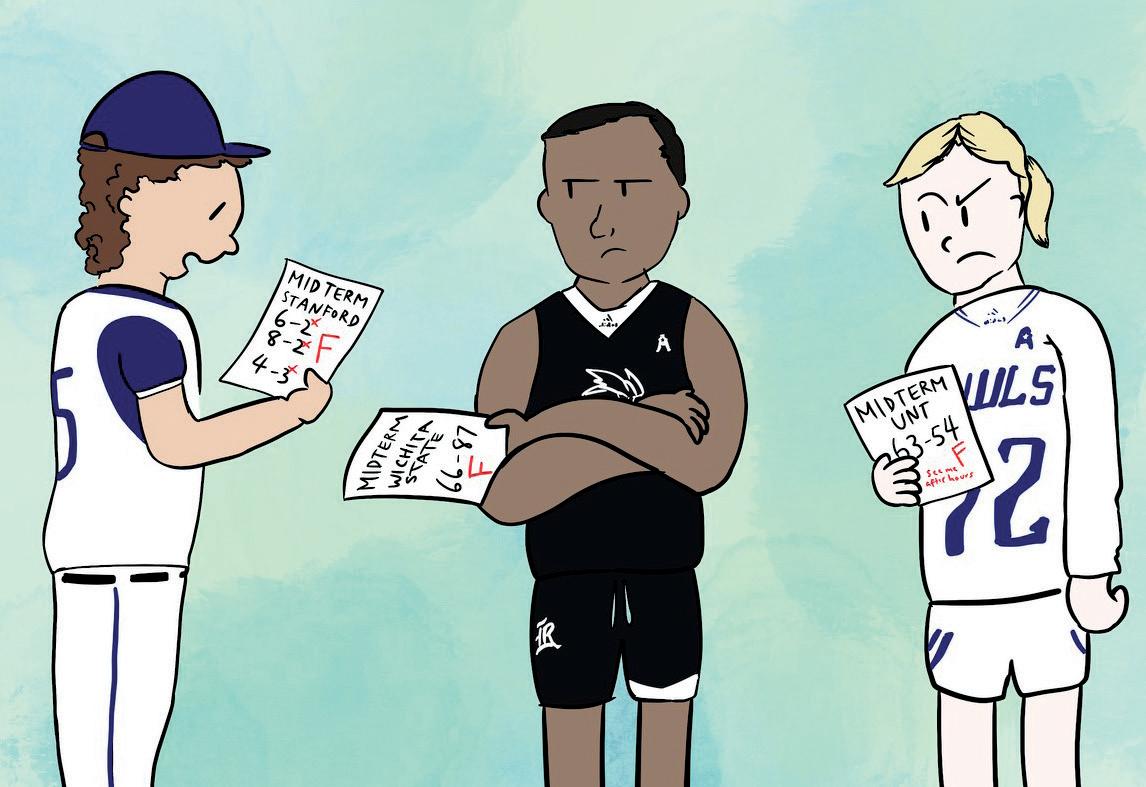

DATE: Wednesday, March 6, 2024
SUBJECT: [REDACTED COLLEGE] Co-advisor Interviews
The Backpage has obtained an exclusive audio recording taken in secret of a certain residential college’s co-advisor interviews. Below we present a transcript of excerpts from the recording. Names of students and colleges have been redacted for the students’ safety.
CO-ADVISOR APPLICANT (CA) entered [COLLEGE REDACTED] Commons at 3:58 PM on Sunday, March 3, 2024.
[chattering, presumably coordinators and advisors mingling with the co-advisor applicants]
COORD #1: Alright everyone, if I could get your attention… alright… great, so I’m [NAME REDACTED], one of this year’s O-Week Coords at [COLLEGE REDACTED]...
COORD #2: I’m [NAME REDACTED], another one of the [COLLEGE REDACTED] coords.
COORD #3: And I’m [NAME REDACTED]. We’re so excited you’re here with us today! Before we begin, if everyone could put their phones in this chest by [NAME REDACTED]—we just want to make sure everyone is as engaged as possible!
CA: [chuckles] Are these those, like, signal-blocking blocking metal boxes? A little overkill, haha!
NEARBY ADVISOR: We take O-Week very seriously here at [COLLEGE REDACTED].
NEARBY ADVISOR #2: It’s all about the New Students!
COORD #1: Perfect, let’s get to our first game: Finish the TikTok Sound!
[…]
COORD #3: Oookay, here’s the first sound! [The first second of a TikTok sound plays.]
NEARBY CO-ADVISOR APPLICANT: Oh my god, I feel like I heard this somewhere!
CA: Are you kidding?! AAAAiiiii think I like this little life!
NEARBY ADVISOR: Oooh, chronically online who? Hahahaha!
CA: I guess so, hahaha!
[…]
INTERVIEWING ADVISOR: Nice New Balances and Carhartt shirt! Did you find those on your own?
CA: Oh nah, I saw them on TikTok and got them off Amazon.
INTERVIEWING ADVISOR: Haha nice, very very nice…
COORD #2: Okay everybody, that was our last TikTok sound, onto our last activity!
[…]
COORD #2: For this one, we’ll go one by one and have you sit at the control panel over there. On the other side of this wall, one of our advisors will be answering [COLLEGE REDACTED] trivia questions! If they answer wrong, you’re just gonna hit this little red button here to give them an itty bitty shock! Keep going until we say to stop!
NEARBY CO-ADVISOR APPLICANT: Wait a minute, I think I’ve heard of thi— [muffled speech, followed by a thud]
[…]
CA: This is so fun, I can’t wait to post about this on Fizz later! [shuffling noises]
COORD #3: Nice celebratory griddy, [CA]! And wow, you made it all the way to 450 volts, that’s got to be a new high score! We’ve been liking what we’re seeing, can you join us in the PDR real quick?
[…]
COORD #3: [muffled] [NAME REDACTED] scored highly on our trend sensitivity benchmark but demonstrated some resistance to our authority today. What do you think?
COORD #1: [muffled] Agreed, wipe him and send him a rejection letter. [distant grunting, then silence]
COORD #2: [muffled] On the other hand, [CA] has shown top marks across both of our impressionability examinations. They’re a prime candidate for our Co-advising Project. That makes thirteen final candidates, let’s administer the neural indoctrination treatment to each.
[…]
COORD #1: Ah, you’re all awake! Sorry about that, there was an… ahem, minor gas leak but don’t worry, it only had a temporary sedative effect.
ALL CO-ADVISORS: [in monotone unison] Yes, Coordinators.
COORD #1: Anywho, congratulations, you’ve been selected to co-advise at [COLLEGE REDACTED]! Now please join in!
ALL CO-ADVISORS: [in monotone unison] Yes, Coordinators.
ALL COORDS: TEAM!
ALL VOICES: [COLLEGE REDACTED]! TEAM! [COLLEGE REDACTED]!